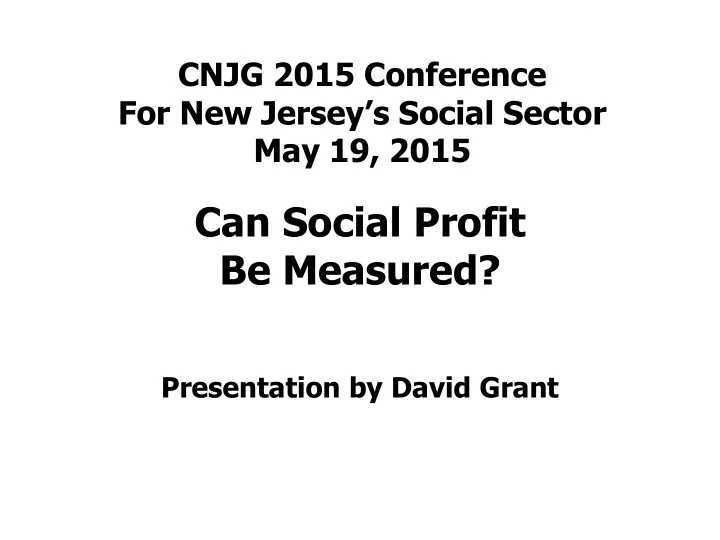

CNJG 2015 Conference For ¡New ¡Jersey’s ¡Social ¡Sector May 19, 2015 Can Social Profit Be Measured? Presentation by David Grant
What does it look like to measure what matters ?
Principle The primary purpose of assessment is to improve performance , not merely audit it.
Concept Planning Backwards
What’s ¡the ¡ difference between planning and planning ahead backwards ?
Photo: Flickr Creative Commons User Didriks
Example: The LEED Scale Leadership in Energy and Environmental Design
LEED Project Check List
Tool: Rubric
Example of a Successful Rubric: GreenFaith (NJ)
GreenFaith Assessment Rubric for Religious Institutions Area of Out of the In the Building a New Eden Restored Institutional Life Garden Wilderness Ark 1. Worship & Spirituality 2. Religious Education 3. Fellowship & Social Life 4. Facility Management 5. Social Outreach 6. Financial Management 7. Influence on Members, Denomination, Community
Example of a Successful Rubric: Geraldine R. Dodge Foundation
Your Rubric 1 2 3 ? ?
What Rubrics Do We Need? Is there a core performance in the work of our organization, one that would benefit from being described specifically so that people can get better at it?
What Rubrics Do We Need? Are there key words in our mission, goals, or strategies that inspire us to ask, “What ¡would ¡ ¡that ¡look ¡like ¡if ¡ we succeeded? ”
What Rubrics Do We Need? Is there something that matters a lot to us that resists quantification and measurement?
What Rubrics Do We Need? Are there people in our organization who need feedback on something important?
What Rubrics Do We Need? Is there something we need to talk about , and should talk about, that we haven’t ¡ found a way yet to talk about?
What Rubrics Do We Need? Is there an essential question to our work, one where we need a vehicle for ongoing discussion ?
What Rubrics Do We Need? Is there a job description in our organization that would benefit from being examined from the multiple perspectives of people who are affected ¡by ¡that ¡person’s ¡performance?
Contributions and Commitments Minimal OK Maximum Board of Trustees Other Volunteers Artistic staff Administrative staff Part-time staff Consultants Donors
Effective Boards Less Most effective Effective effective Who Board Members ARE What TRAITS they have What Board members DO
What do Trustees DO ? Low Middle High At meetings Between meetings In community In relation to ED
Your Rubric 1 2 3 ? ?
Observation The later an organization made performance measurement part of its culture, the more disruptive the process was. From EMC White Paper
From Michael Fullan The Six Secrets of Change • … ¡What ¡the ¡Best ¡ Leaders Do to Help Their Organizations Survive and Thrive
Fullan: Secret #1 Love Your Employees
Fullan: Secret #2 Connect Peers with Purpose
Fullan: Secret #3 Capacity Building Prevails
Fullan: Secret #4 Learning is the Work
Fullan: Secret #5 Transparency Rules
Fullan: Secret #6 Systems Learn
The Covey Matrix urgent not urgent important I II not III IV important
Golden Circles Board/Staff Drive From xxxx
Golden Circles From Simon Sinek
Golden Circles Board/Staff Drive Design Thinking From Tim Brown, Change by Design
Golden Circles Board/Staff Drive Design Thinking From Tim Brown, Change by Design
Golden Circles Board/Staff Drive Design Thinking Divergence/Convergence create make diverge converge choices choices From Tim Brown, Change by Design
Golden Circles Board/Staff Drive Design Thinking Divergence/Convergence closure business zone as usual create make divergent convergent diverge converge zone zone choices choices From Sam Kaner, The Facilitator’s ¡Guide ¡to ¡ Participatory Decision- Making
What gets in the way of this work?
The Covey Matrix urgent not urgent important I II not III IV important
Beckhard’s Change Model Vision < Resistance ? > Resistance Vision x First Steps x Dissatisfaction with Status Quo > D x V x F > R
Effective Assessment : D x V x F > R IS a FIRST STEP Sharpens VISION Increases DISSATISFACTION Reduces RESISTANCE
Adding to the Change Model D x V x F > R Plus LEADERSHIP D x V x F x L > R
Acknowledgements Susan Stevens; Tim Brown; Steven Covey; Simon Sinek; Sam Kaner. Questions? Comments? David Grant dgrant050@gmail.com 802-765-4775
Recommend
More recommend